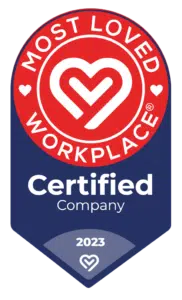The Impact of Flexibility and Flexible Work Environments on Employee Well-being
6 min. Read
Flexibility has taken on a new level of importance in today’s rapidly changing workplace. Flexible work arrangements, like remote work and flexibility in work hours, have become increasingly common, offering employees greater autonomy over how, when, and where they work. This shift towards flexibility has profound implications for employee satisfaction, engagement, and overall well-being.
Table of Contents
Employee Satisfaction and Flexibility
Flexibility in the workplace has a direct impact on employee satisfaction. When employees are free to manage their work schedules and environments, they experience greater control over their lives. This control can increase job satisfaction, as employees feel more empowered and engaged.
Flexible work arrangements also contribute to higher levels of overall job satisfaction by promoting a better work-life balance. Employees who can attend to personal responsibilities, such as childcare or medical appointments, without sacrificing work commitments are more likely to feel satisfied with their jobs.
Enhanced Autonomy and Control
Flexibility in work schedules and environments grants employees greater autonomy and control over their work lives. This empowerment leads to a sense of ownership and responsibility, boosting job satisfaction.
Improved Work-Life Balance
Flexible work arrangements enable people to balance their professional and personal lives more effectively. This balance reduces stress and burnout, enhancing overall job satisfaction and well-being.
Increased Job Satisfaction
When employees can manage their work in a way that suits them best, they are more likely to feel satisfied with their jobs. Flexibility allows people to align their work with personal values and priorities, increasing job satisfaction.
Employee Engagement and Flexibility
Employee engagement is closely linked to flexibility in the workplace. When people feel trusted and empowered to manage their schedules and work environments, they are more likely to be engaged and love where they work. Flexible work arrangements can increase employee motivation, productivity, and creativity.
Flexible work environments also foster a culture of trust between employers and employees. When employers offer flexibility, they demonstrate that they value their employees’ well-being and trust them to manage their work effectively. This trust is a key driver of employee engagement and loyalty.
Trust and Empowerment
Flexibility demonstrates trust in employees’ ability to manage their schedules and work environments. This trust leads to increased engagement, as employees feel valued and respected.
Enhanced Motivation and Productivity
Employees who control how and when they work are often more motivated and productive. Flexibility allows people to work during their most productive hours, leading to better outcomes.
Fostering Creativity and Innovation
Flexible work arrangements encourage creativity and innovation by allowing employees to experiment and explore new ideas. This freedom leads to a more dynamic and innovative workplace culture.

Building a Thriving Workplace Culture!
Discover how to leverage the right technology and implement a proactive strategy that cultivates talent and facilitates team collaboration.
Employee Well-being and Flexibility
The impact of flexibility on employee well-being cannot be overstated. Flexible work arrangements can reduce stress levels among employees by providing them with greater control over their work schedules. This control can help employees better manage work-related stressors and improve their mental health.
Flexible work arrangements also contribute to physical well-being by reducing the need for commuting. Remote work, in particular, eliminates the daily commute, which can result in less time spent sitting in traffic or on public transportation. This reduction in commuting time allows employees to devote more time to activities that promote physical health, such as exercise or meal preparation.
Stress Reduction
Flexible work arrangements help reduce stress levels by allowing employees to manage their work schedules in a way that minimizes stressors. This stress reduction contributes to improved mental health and well-being.
Improved Physical Health
Flexible work arrangements, particularly remote work, can reduce the need for commuting, leading to better physical health. Employees have more time for physical activities and healthier lifestyles, improving overall well-being.
Better Work-Life Integration
Flexibility enables employees to integrate their work and personal lives more seamlessly. This integration reduces conflicts between work and personal responsibilities, enhancing overall well-being.
Work-Life Balance and Flexibility
 Work-life balance is vital to employee satisfaction and well-being. Flexible work arrangements enable employees to achieve a healthy balance between their work and personal lives. Employees who prioritize their responsibilities alongside their work commitments are more likely to experience greater overall satisfaction and well-being.
Work-life balance is vital to employee satisfaction and well-being. Flexible work arrangements enable employees to achieve a healthy balance between their work and personal lives. Employees who prioritize their responsibilities alongside their work commitments are more likely to experience greater overall satisfaction and well-being.Personalized Work Schedules
Flexibility allows employees to create personalized work schedules that accommodate their responsibilities. This customization leads to a better work-life balance and increased job satisfaction.
Reduced Burnout
By offering flexibility, organizations can minimize employee burnout. Those who can balance their work and personal lives are less likely to experience burnout, leading to higher job satisfaction and productivity.
Remote Work Benefits and Flexibility
The rise of remote work has highlighted the many benefits of flexibility in the workplace. Remote work allows people to work from anywhere, creating a work environment that suits their preferences and needs. It can increase productivity and job satisfaction, as employees can work in a way that works best for them.
Location Independence
Remote work offers people the freedom to work from any location, providing them freedom and flexibility. It ensures greater job satisfaction and employee retention.
Improved Work Efficiency
Flexible work arrangements, like remote work, can improve work efficiency by eliminating the distractions and interruptions often in traditional office environments. Employees can focus on their work without the need to commute or deal with office-related disruptions.
Cost Savings
Remote work can save money for both employees and employers. Employees can save money on commuting and work-related expenses, while employers can reduce overhead costs associated with maintaining physical office spaces.
Final Word
Flexibility and flexible work environments significantly impact employee satisfaction, engagement, and well-being. Employers who offer flexible work arrangements demonstrate their commitment to supporting their employees’ personal and professional lives, leading to a more satisfied, engaged, and productive workforce.
Embracing flexibility is not only beneficial for employees but also for organizations striving to create a Most Loved Workplace®. Learn more about how a Most Loved Workplace® ensures flexibility to boost employee satisfaction.

Louis Carter is the founder and CEO of Best Practice Institute, Most Loved Workplace, and Results-Based Culture. Author of In Great Company, Change Champions Field Guide, and Best Practices in Talent Management, as well as a series of Leadership Development books. He is a trusted strategic advisor and coach to CEOs, CHROs, and leaders of mid-sized to F500 companies – enabling change and steering employer brand development together with highly effective teams, leaders, and organizations as a whole.



0 Comments